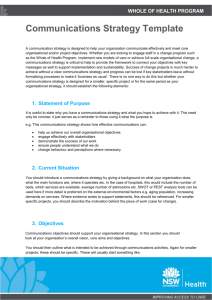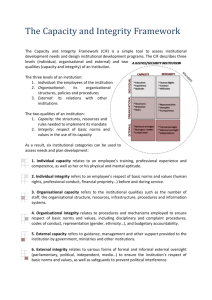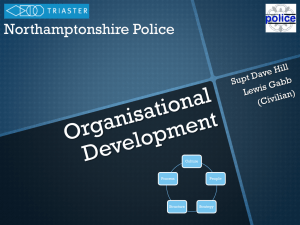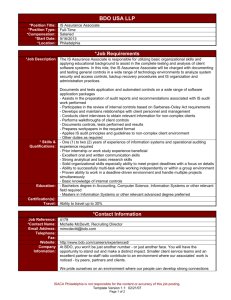Sample unit of work * Organisational, time management and
advertisement
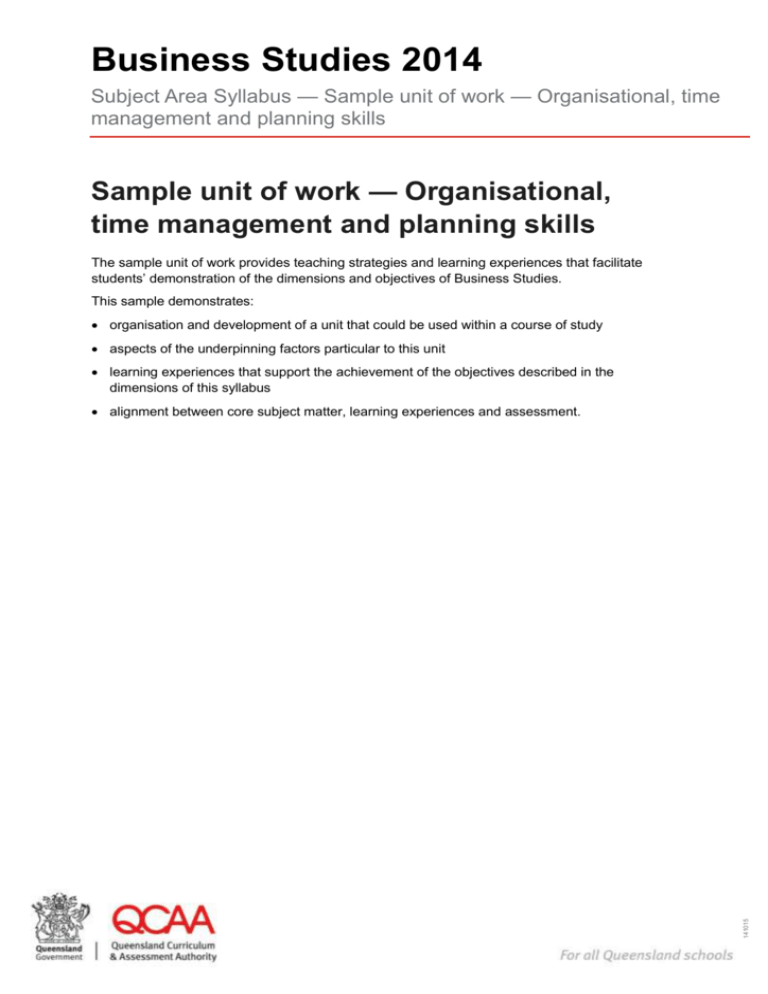
Business Studies 2014 Subject Area Syllabus — Sample unit of work — Organisational, time management and planning skills Sample unit of work — Organisational, time management and planning skills The sample unit of work provides teaching strategies and learning experiences that facilitate students’ demonstration of the dimensions and objectives of Business Studies. This sample demonstrates: organisation and development of a unit that could be used within a course of study aspects of the underpinning factors particular to this unit learning experiences that support the achievement of the objectives described in the dimensions of this syllabus 141015 alignment between core subject matter, learning experiences and assessment. Unit overview Organisational, time management and planning skills How can effective organisational, time management and planning skills contribute to the effective operation of a real estate business? Time allocation: Semester 3; 25 hours Dimensions and objectives Knowledge and understanding Analysing and applying Planning and evaluating describe concepts and ideas analyse business information make and justify decisions for related to business functions explain concepts and ideas related to business functions demonstrate processes, procedures and skills related to business functions to complete tasks. related to business functions and contexts apply knowledge, understanding and skills related to business functions and contexts use language conventions and features to communicate ideas and information. business solutions and outcomes plan and organise business solutions and outcomes evaluate business decisions, solutions and outcomes. Content to be taught Core Business practices Concepts and ideas Identified knowledge, understanding and skills Business fundamentals (BF) BF1: Essential and fundamental knowledge exists for the different business functions. BF3: Organisational policies and procedures provide a framework for principles, rules and guidelines to support safe and effective work practices. BF4: The changing nature of business leads to varied and emerging employment options and roles. importance of planning and organising information planning and prioritising work identifying work goals and plans monitoring and adjusting work practices to maintain efficiency opportunities for improving administrative processes and procedures, e.g. new ideas, seek opportunities to improve resource efficiency, organisational plans, workplace practices organisational policies and procedures manual, e.g. scheduling, planning, resources allocation administration roles and responsibilities, e.g. receptionist, secretary, executive assistant Business communication (BC) BC1: Effective interpersonal and organisational skills are essential for quality staff and customer relations. Demonstrate and apply interpersonal skills, e.g. discretion, diplomacy, tact, delegation, networking. Demonstrate and apply verbal skills, e.g. answering phone calls, interacting with customers/clients/colleagues. Manage schedules and organisational requirements, e.g. using organisational tools, Business Studies 2014 Subject Area Syllabus — Sample unit of work — Organisational, time management and planning skills Page 2 of 5 Queensland Curriculum & Assessment Authority December 2014 establishing timelines, selecting resources. Use effective communication strategies and techniques within the team and with other stakeholders, e.g. seeking feedback, reviewing ideas, identifying issues, allocating tasks, setting individual targets. Establish and apply effective ways of working, e.g. ground rules, protocols, scheduling of activities, supporting and guiding colleagues. Business technology (BT) BT1: A variety of existing and emerging technologies are used to improve business processes and to meet identified purposes. BT2: Word processing software is used to create effective and professional business documents. BT3: Software applications are used to effectively manage, calculate and display business data and records. Select and use appropriate software for organising information, monitoring scheduling and booking resources. Use technology to monitor and improve administration processes and procedures. Use of word processing software to complete tasks, e.g. use of templates, forms, letters, memos, reports, tables. Use desktop publishing features, e.g. templates, importing text and graphics, font, layout, styles. Use software to monitor workflow, e.g. use of spreadsheet to monitor tasks, use of databases. Input, organise and format data, e.g. visual charts, tables, filters, sort. Learning experiences The office administration assistant of a local real estate business is taking 6 months leave. The company has asked you to hire someone to fill the position. Brainstorm the roles and responsibilities of a secretary in a real estate context. Develop a list of personal qualities and skills you would ideally like the candidate to possess. BF1, BF4 In pairs, use a variety of case studies to roleplay responses to incoming calls. For each call, evaluate the effectiveness of the response using criteria such as: How promptly was the call answered? How clear, polite and positive was the communication? Did the response follow the Organisational Policies and Procedures Manual? What action was taken? e.g. message, follow-up How was the message recorded? How efficiently was the phone call responded to? BC1, BF3 Discuss different local real estate businesses. In small groups, research the different administrative roles that exist in the real estate industry. Analyse whether different administrative roles and responsibilities exist between small and large real estate businesses. Explain the similarities and differences through a comparative table. BF1, BF4 Conduct research to identify the different software applications that can be used to plan and organise resources in the real estate context. Describe the various features (i.e. layout, content) of each of the applications. Use a visual organiser to communicate and represent the different features. Examples of software applications include Microsoft Word, Microsoft Outlook, Microsoft Excel, JIRA, Doodle, Google calendar. BT1, BT2, BT3 Invite a guest speaker from a real estate business to provide: an overview of their Organisational Policies and Procedures Manual (OPPM) describe their booking procedures explain the ways of monitoring their staff’s schedules. BF3 You, as executive assistant in a real estate business, have been given a large amount of tasks to complete in preparation for the end of the financial year. In order to complete these efficiently and Business Studies 2014 Subject Area Syllabus — Sample unit of work — Organisational, time management and planning skills Page 3 of 5 Queensland Curriculum & Assessment Authority December 2014 effectively, complete the following steps: identify tasks you would be likely to receive in the situation described above apply technology skills to develop a task list template using a software application organise the tasks into a list of importance explain the impact on the organisation if the task list was not completed within the allocated time. BF1, BF3, BC1, BT1 Listen to and summarise information given by a guest speaker from a local recruiting company who is speaking on: ‘Personal goal setting is just as important as business planning.’ OR ‘The challenge facing employees is to judge the optimum amount of time required to complete a task properly.’ Prepare a brochure or booklet for a new employee, which describes the concepts of goal-setting and explains the importance of setting effective goals to achieve success in your business. BF1 Apply the SMART goal-setting strategy to an area of life, such as studies. Using a software application, plan and develop a goal-setting template that: states specific goals describes how the goals will be measured explains why the goals are important analyses the goals to identify the actions required to achieve the goals plans and allocates a corresponding timeline to support each action item. BF1, BT1, BT2 Research the skills and techniques that are required in delegation. Review the article http://kochiesbusinessbuilders.com.au. Prepare a factsheet for publication that describes the key aspects of delegation. BC1 Prepare and complete a time log for yourself for a period of one week. At the end of the week, analyse the time log to determine: Were all objectives achieved? When was the most productive time of the day? When was the least productive time of the day? Which activities took the most time? How many interruptions occurred? BF1, BC1, BT1 Interview a group of peers or teachers to identify the tools and strategies (e.g. weekly schedule, to-do lists, time logs) that are used to manage time and tasks efficiently and effectively. Prepare a presentation to share with your peers which: describes the different tools and strategies analyses how effective these tools and strategies are when aiming to achieve short-term, mediumterm and long-term goals makes and justifies the most appropriate tools and strategies to use when organising a study plan. Based on findings from your time log and knowledge gained regarding effective time management, devise a procedure that will help successfully accomplish a given number of tasks in an efficient way. BF1, BC1, BT1 Using a real estate business case study, prepare a schedule of appointments for a number of employees. The case study may involve rental property inspections, open houses, auctions and client meetings. Use an appropriate software application (e.g. Microsoft Outlook, Microsoft Excel, Google calendar, databases) to create a list of the tasks that must be completed over the next week. For the list of tasks: apply a timeline for completion organise and categorise each task according to its priority analyse the list of tasks to determine the estimated time, ideal time and real time apply technology skills to prepare a weekly schedule which visually represents the timelines. BF1, BT1, BT2, BT3 Business Studies 2014 Subject Area Syllabus — Sample unit of work — Organisational, time management and planning skills Page 4 of 5 Queensland Curriculum & Assessment Authority December 2014 Assessment Assessment technique Project Dimensions assessed Knowing and understanding Analysing and applying Planning and evaluating Description of instrument Undertake a field trip to a real estate business to observe and analyse how they coordinate, manage and monitor the appointment schedules of their staff. Practical component: Compilation of survey questions to interview different employees. The survey should examine concepts and ideas such as: organisational skills time management strategies choice of organisational tools and devices techniques for managing stress ability to prioritise tasks strategies for reviewing and evaluating tasks. Multimodal component: Prepare and deliver a presentation to the staff which evaluates their existing processes and procedures and provides recommendations for improvements. Assessment conditions Practical component: survey, data compilation, e.g. graphs Multimodal component: 3–6 minutes Business Studies 2014 Subject Area Syllabus — Sample unit of work — Organisational, time management and planning skills Page 5 of 5 Queensland Curriculum & Assessment Authority December 2014





